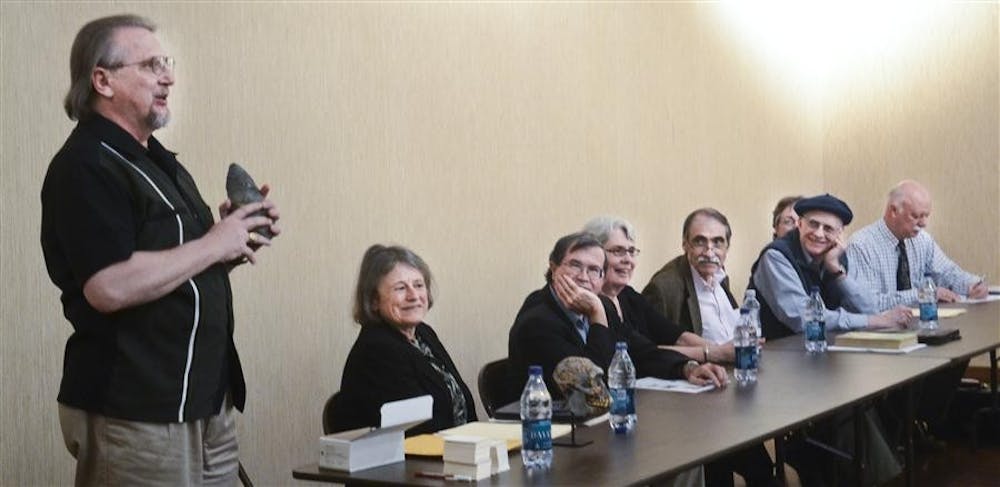Several IU science faculty joined Walter Alvarez, professor emeritus of Earth and Planetary Sciences at the University of California, Berkeley, in the panel discussion “Evolution in the 21st Century: Science, Education, and Politics” on Wednesday at the Mathers Museum of World Cultures.
Origins of life on Earth
Lisa Pratt, provost’s professor of Geological Sciences, discussed what she described as an extreme lack of information that exists about the origin of life. She said not much is moving forward with the initiatives behind these studies.
“We seem to know less by the day instead of more by the day,” Pratt said.
Pratt said there is no general agreement about the origin of life on Earth or of life anywhere else.
“To accept the fact that scientists can’t seem to reach an agreement on the most basic ideas is troubling,” Pratt said. “We are stuck in a scientific rut.”
Pratt said scientists have been trying to figure out how to create life in a test tube for 50 years and have failed.
Because of this, she said people must accept the idea that life is not readily formed in ordinary conditions.
Before tackling the origin of life, Pratt said one has to start with the basics.
“It would be absolutely delightful if we even had a definition of life because we won’t have one now,” she said.
Field of Big History is gaining popularity
Alvarez discussed his interest in a new emerging field called Big History, which he described as the history of everything possible a person has the chance of observing.
Alvarez said science has worked really well by specialization. These specializations include the cosmos, earth, life, humanity and what they all have to do with each
other.
“Big History has a wonderful effect of bringing together humanistic scholars with people like us who do science,” he said.
Alvarez has a reputable name in his field and is best known for his work establishing the theory that an asteroid collision caused the mass extinction of the dinosaurs.
“Walter Alvarez is one of the most distinguished scientists of our time,” wrote Kathy Schick and Nicholas Toth, co-directors of the CRAFT Research Center and the Stone Age Institute, according to a press release.
“As a geologist, he teamed up with his father, the physicist and Nobel laureate Luis Alvarez, and proposed the hypothesis that the dinosaur extinction 65 million years ago was caused by a catastrophic extraterrestrial impact of an asteroid or comet.
“Subsequent research over the past several decades has supported this hypothesis, including the discovery of a gigantic impact crater of the same time in the Yucatan area.”
Tracing back to a common ancestor
Professor of Anthropology Kathy Schick discussed the field of paleoanthropology and the effects of Darwin’s “Origin of Species.”
“It’s really since ‘Origin of Species’ that people open their eyes to this fact that there’s this deep, deep history to everything, including the earth, animal forms and other human forms,” she said.
She said a big question paleoanthropologists have is tracing back to the last common ancestor.
“We and the chimpanzees have evolved from a common ancestor,” she said. “They’ve had their own evolutionary trajectory, and we’ve had ours. How far back can we trace our lineage to that split? We’re getting closer and closer.”
Walter Alvarez will present “Big History: A Bridge Between Humanities and Sciences” on March 26 in the Whittenberger Auditorium at the Indiana Memorial Union.
Science faculty attend panel to discuss evolution, politics
Professor who established dinosaur extinction theory among panelists

Get stories like this in your inbox
Subscribe





